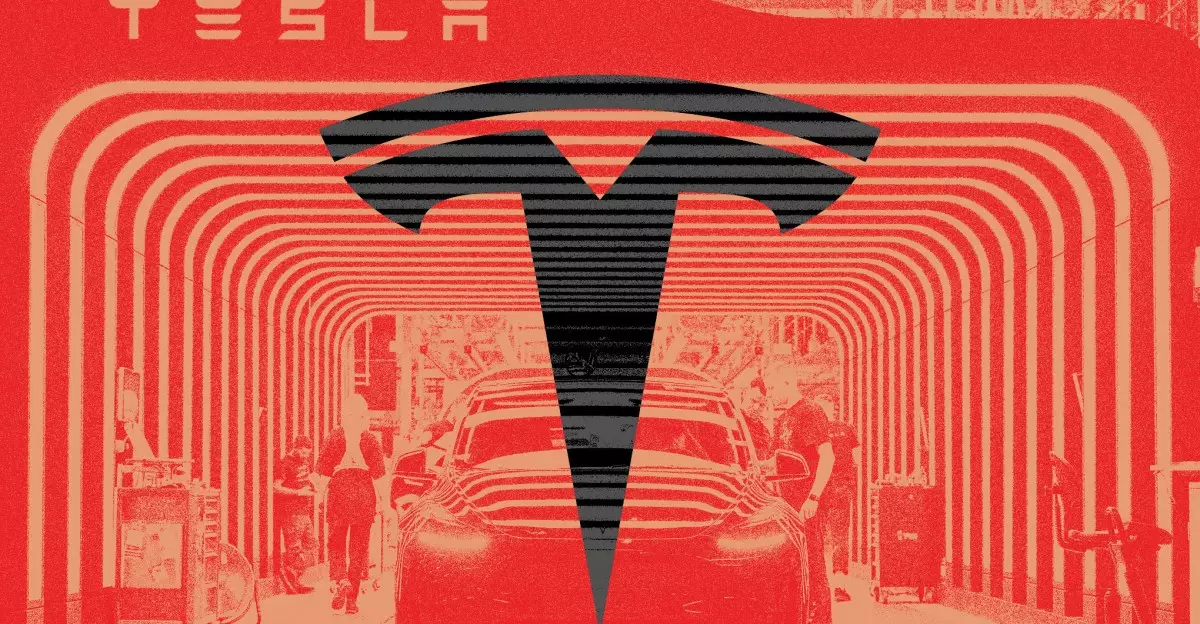Tesla’s recent sales data paints a bleak picture for the electric vehicle giant, especially in the European market. A staggering dip of nearly 50% in vehicle registrations highlights a significant crisis that cannot go unnoticed. With only 7,261 new vehicle registrations reported in April—a figure that starkly contrasts with the successes of prior years—the situation is dire. While the broader electric vehicle market in Europe is thriving, Tesla’s struggle raises critical questions about its brand identity and strategic direction in a rapidly evolving automotive landscape.
As electric vehicle (EV) sales surged across Europe by 26.4% in the same timeframe, capturing a notable 15.3% of the total EU market share, Tesla’s failure to capitalize on this growth signals a misalignment with consumer expectations and market realities. The recent launch of the updated Model Y, designed to attract new customers, seems not to have delivered the intended results. This disconnect is a clear indicator that consumers are seeking more than just innovative technology; they are demanding alignment with values, responsiveness to market trends, and a coherent brand narrative.
Competition: A Growing Threat
One of the primary catalysts impacting Tesla’s declining fortunes is the intensifying competition from both established European manufacturers and emerging Chinese companies. Brands like Volkswagen, BMW, and newer entrants showcase an increasing willingness to innovate and meet the demands of a more discerning consumer base. Tesla, once synonymous with electric innovation, now faces an uphill battle to maintain its image as the leader in sustainable transportation. This competition not only encroaches on Tesla’s market share but also complicates its brand narrative, which heavily relied on a pioneering spirit.
What’s more, the low registration numbers can be seen as a symptom of a larger issue: the perception of Tesla. While the brand was once seen as the favorite choice among environmentally conscious consumers, its image has suffered due to a series of decisions that have raised eyebrows. The political entanglements of CEO Elon Musk, particularly his support for controversial figures and policies, can be perceived as detracting from the brand’s focus on sustainability and innovation. European consumers, attuned to the socio-political context, may feel disenchanted by a brand that seems to oscillate between corporate and political interests.
The Impact of Leadership and Brand Perception
Elon Musk’s political posturing has not only drawn criticism but appears to be contributing to a decline in Tesla’s reputation. Despite boasting a legacy of groundbreaking technology, a recent survey indicated that Tesla found itself ranked 95th in terms of reputation, which is a stark drop from its previous standing. The symbiotic relationship between Musk and Tesla has dimmed, as public perception shifts from admiration to skepticism.
Musk’s recent claims of focusing more on company operations, while maintaining political involvement, suggest a balancing act that could alienate both committed followers and casual consumers. In an age where brand loyalty is often tied to leaders’ values and actions, a CEO’s social standing can have enormous repercussions. Thus, Tesla’s strategy of tying Musk’s personal brand too closely to corporate identity appears to be a misstep during a time when authenticity and responsibility are paramount to consumers.
The Road Ahead: A Call for Reassessment
While Musk maintains optimism about an eventual rebound in sales, asymmetric focus on areas such as AI and robotics distracts from the pressing needs of the consumers and market. Returning to a consumer-centric approach may serve as a stepping stone back to relevance. Innovation alone is no longer sufficient in an era marked by significant competition and demand for corporate accountability.
Investors and analysts alike are left unsettled as they await tangible results from Tesla’s recent changes. The enthusiasm surrounding electric vehicles remains unabated, but it is increasingly tied to brands that evoke trust, responsiveness, and ethical leadership—qualities that Tesla must diligently work to reclaim. With the stakes higher than ever, the path to revitalization will depend on whether Tesla can recalibrate its focus, embrace transparency, and engage with its consumers not just as buyers but as integral partners in the electric vehicle revolution.

